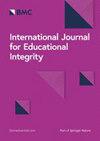Algorithmically-driven writing and academic integrity: exploring educators' practices, perceptions, and policies in AI era
IF 6.9
Q1 EDUCATION & EDUCATIONAL RESEARCH
International Journal for Educational Integrity
Pub Date : 2024-03-20
DOI:10.1007/s40979-024-00153-8
引用次数: 0
Abstract
Despite global interest in the interface of Algorithmically-driven writing tools (ADWTs) and academic integrity, empirical data considering educators' perspectives on the challenges, benefits, and policies of ADWTs use remain scarce. This study responds to calls for empirical investigation concerning the affordances and encumbrances of ADWTs, and their implications for academic integrity. Using a cross-sectional survey research design, we recruited through snowball sampling 100 graduate students and faculty members representing ten disciplines. Participants completed an online survey on perceptions, practices, and policies in the utilization of ADWTs in education. The Technology Acceptance Model (TAM) helped us understand the factors influencing the acceptance and use of ADWTs. The study found that teacher respondents highly value the diverse ways ADWTs can support their educational goals (perceived usefulness). However, they must overcome their barrier threshold such as limited access to these tools (perception of external control), a perceived lack of knowledge on their use (computer self-efficacy), and concerns about ADWTs' impact on academic integrity, creativity, and more (output quality). AI technologies are making headway in more educational institutions because of their proven and potential benefits for teaching, learning, assessment, and research. However, AI in education, particularly ADWTs, demands critical awareness of ethical protocols and entails collaboration and empowerment of all stakeholders by introducing innovations that showcase human intelligence over AI or partnership with AI.算法驱动的写作与学术诚信:探索人工智能时代教育工作者的实践、认知和政策
尽管全球都在关注算法驱动写作工具(ADWTs)与学术诚信之间的关系,但考虑到教育工作者对使用ADWTs的挑战、益处和政策的看法的实证数据仍然很少。本研究响应了关于对 ADWT 的承受能力和负担及其对学术诚信的影响进行实证调查的呼吁。我们采用横断面调查研究设计,通过滚雪球式抽样,招募了代表十个学科的 100 名研究生和教师。参与者完成了一项在线调查,内容涉及在教育中使用自动化数据采集工具的看法、实践和政策。技术接受模型(TAM)帮助我们了解了影响接受和使用 ADWT 的因素。研究发现,受访教师高度评价自动化数据和通信技术能以多种方式支持他们的教育目标(感知有用性)。然而,他们必须克服自己的障碍门槛,如使用这些工具的机会有限(外部控制感)、缺乏使用这些工具的知识(计算机自我效能感),以及担心 ADWT 对学术诚信、创造力等的影响(输出质量)。由于人工智能技术在教学、学习、评估和研究方面已被证实并具有潜在优势,因此越来越多的教育机构开始采用人工智能技术。然而,人工智能在教育领域的应用,特别是自动化数据处理技术,需要对伦理协议有严格的认识,并需要所有利益相关者的合作与赋权,引入创新技术,展示人类智能优于人工智能或与人工智能的伙伴关系。
本文章由计算机程序翻译,如有差异,请以英文原文为准。
求助全文
约1分钟内获得全文
求助全文
来源期刊

International Journal for Educational Integrity
EDUCATION & EDUCATIONAL RESEARCH-
CiteScore
6.90
自引率
26.10%
发文量
25
审稿时长
22 weeks
 求助内容:
求助内容: 应助结果提醒方式:
应助结果提醒方式:


